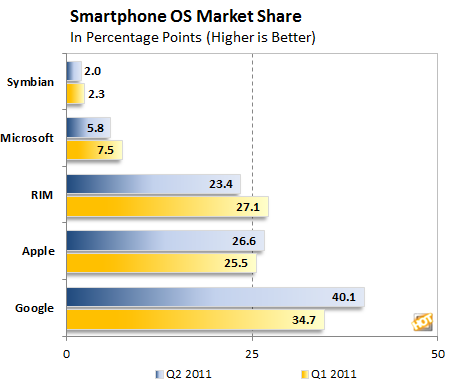Microsoft Continues To Bleed Mobile Market Share, Despite WP7
Windows Phone 7 was supposed to reverse Microsoft's declining market share, prove that the company was capable of designing a product that could stand against the best Android and Apple had to offer, and re-establish the company as a major player in the smartphone space. Despite generally positive reviews, WP7 has failed to improve Redmond's mobile fortunes; the company's share of the mobile market fell significantly in Q2 2011.
The latest comScore data indicates that the total US smartphone market grew eight percent in the second quarter for a total of 78.5M smartphone owners. Despite this, Microsoft's piece of the pie shrank by nearly 23 percent. The graph below shows the changes in standing for the five major OS vendors between Q1 and Q2 of this year. Google is the big winner here; the smartphone industry's growth rate is clearly being driven by Android-powered devices.

As ominous as percentage declines can appear, they aren't always accurate. The smartphone market has grown nearly 50 percent in the last twelve months, from 53.4M devices in July 2010 to 78.5M in June, 2011. We've gone back and pulled comScore's measurements for the past four quarters in order to measure the real change in Windows Mobile users after the expanding smartphone market is taken into account.

The results are sobering. Smartphone sales may be up 50 percent year-on-year, but the total number of phones running a Windows Mobile OS has fallen by nearly 30 percent. Keep in mind that comScore's data tracks phones in use, rather than the sale of new units. This implies that WP7 has generally failed to attract either first-time buyers or individuals whose previous smartphones ran an earlier version of Windows Mobile. That's a slap to Microsoft's ambitions, particularly given the fact that WP7 and its subsequent updates have been fairly well received.
Must-Have Mango

Whoops. Wrong Mango.
Microsoft has already RTM'd WP7's firstService Pack major update, codenamed Mango, but declined to disclose when we'll see the update shipping on new hardware. In theory, Mango packs enough improvements to win a fresh look from consumers who passed on WP7 at launch. The update includes Internet Explorer 9 (with its support for GPU rendering and HTML5), true multitasking, 4G compatibility (on 4G phones), and support for Microsoft's Office365.
Similarly, the company has planned a joint press conference with Nokia for August 17, but hasn't commented on what it intends to unveil at that event, either. Presumably we'll see the first fruits of the major alliance the two companies' announced earlier this year, but details on what to expect are limited. Both partners have attempted to paint their wedding as a marriage of strengths but are increasingly reminiscent of two drunks leaning on each other just to stay standing. MS needs Nokia to execute flawlessly when it comes to handset pricing and design, while Nokia, having bet the farm on Windows Phone 7, needs Mango to attract the sort of consumer attention WP7 didn't.
The latest comScore data indicates that the total US smartphone market grew eight percent in the second quarter for a total of 78.5M smartphone owners. Despite this, Microsoft's piece of the pie shrank by nearly 23 percent. The graph below shows the changes in standing for the five major OS vendors between Q1 and Q2 of this year. Google is the big winner here; the smartphone industry's growth rate is clearly being driven by Android-powered devices.

As ominous as percentage declines can appear, they aren't always accurate. The smartphone market has grown nearly 50 percent in the last twelve months, from 53.4M devices in July 2010 to 78.5M in June, 2011. We've gone back and pulled comScore's measurements for the past four quarters in order to measure the real change in Windows Mobile users after the expanding smartphone market is taken into account.

The results are sobering. Smartphone sales may be up 50 percent year-on-year, but the total number of phones running a Windows Mobile OS has fallen by nearly 30 percent. Keep in mind that comScore's data tracks phones in use, rather than the sale of new units. This implies that WP7 has generally failed to attract either first-time buyers or individuals whose previous smartphones ran an earlier version of Windows Mobile. That's a slap to Microsoft's ambitions, particularly given the fact that WP7 and its subsequent updates have been fairly well received.
Must-Have Mango

Whoops. Wrong Mango.
Microsoft has already RTM'd WP7's first
Similarly, the company has planned a joint press conference with Nokia for August 17, but hasn't commented on what it intends to unveil at that event, either. Presumably we'll see the first fruits of the major alliance the two companies' announced earlier this year, but details on what to expect are limited. Both partners have attempted to paint their wedding as a marriage of strengths but are increasingly reminiscent of two drunks leaning on each other just to stay standing. MS needs Nokia to execute flawlessly when it comes to handset pricing and design, while Nokia, having bet the farm on Windows Phone 7, needs Mango to attract the sort of consumer attention WP7 didn't.

